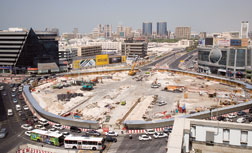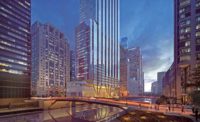Traffic in Dubai is still nightmarish by most standards, but it is starting to lighten as foreign professionals leave the country amid layoffs and cancelled or halted construction projects. “There is no question that Dubai has slowed down,” says one American architect working in the region. “Everyone is seeing the impacts of the global crisis now.”

So dramatically has the crisis hit in the United Arab Emirate that new urban legends have sprouted, replacing previous tales of unimaginable wealth and innovative designs with new stories of doom and gloom. The most common story tells of suddenly unemployed foreigners leaving behind luxury cars at the airport with keys in the ignition, never to return. “You can get a barely-used Porsche for $25,000,” says one local, describing the efforts of the government to off-load the abandoned cars. Another tells of used Bentleys offered as an incentive to buy the vacant properties on the Palm Jumeirah—to no avail.
Not everyone is in despair. Following nearly a decade of frenetic growth, some see an opportunity in the downturn to shift from speculative development to more rational, planned construction.
For now, most of the focus is on the recession. With oil and property values spiraling downward, Dubai’s construction market is undergoing dramatic change. Project activity is slowing, market speculators are rapidly disappearing and once-generous banks are tightening their belts. Residential high-rises that once represented sound investments instead stand empty, overlooking the city’s half-finished skyline.
Growth estimates have dropped accordingly, with the emirates’ own government projecting figures as low as 2.5% (down from 6% to 8% in 2008) and other groups such as Standard Chartered Bank quoting lower figures around .5%. Emaar, the UAE’s largest property developer, recently announced a 15% drop in operating profits following fourth-quarter losses in 2008, and its competitor Nakheel, developer of the Palm and World Islands projects, now openly cites delays on key projects like the Trump Towers Hotel on the Palm Jumeirah. Nakheel also has reportedly stopped work on its planned 1-km-tall tower.
In a global economy where market forecasts are universally depressing, however, the downturn may have a bright side, say sources. “This is really a market correction,” explains Emil Rademeyer, director of Dubai-based market researchers Proleads Global. “What’s happening here would have happened anyway in a few more years.” The downturn will likely give the market a chance to shift from speculative development to planned construction, he says.
“It’s going to take some time to adjust to this downturn. The market is still volatile and it will take a while to normalize prices,” says Gordon Gill of Smith + Gill Architects. “We are hoping this slower pace and this correction will yield naturally better buildings. The price of construction is coming down and there are much more competitive bids for buildings. Banks are being impacted and loans are being much more carefully distributed.”
Sources hope a slow market will allow the government to focus on sorely needed infrastructure development, which has been far outpaced by the building sector in recent years.
For the firms that expect to survive the slowdown, a cautious optimism is emerging. “In early 2008, we had a hard time getting responsive bidders for the piling works phase of our project,” says P.K. Bagchi, project director at Hill International. “Now as we prepare for the next project phase, we’re expecting bidders to really sharpen their pencils if they’re interested in this project. There’s going to be a lot more competition.”
Firms are even entering the market despite the slowdown. According to Mark Kiszonak, vice president and office director for HKS Architect’s new regional office in Dubai’s bigger neighbor, Abu Dhabi, the financial crisis only solidified plans to grow a presence in the Middle East. “Growth potential in these emerging markets is huge,” says Kiszonak. “Opportunities will present themselves; it’s just a matter of knowing where to look and responding as these markets rebound and improve.”



Post a comment to this article
Report Abusive Comment